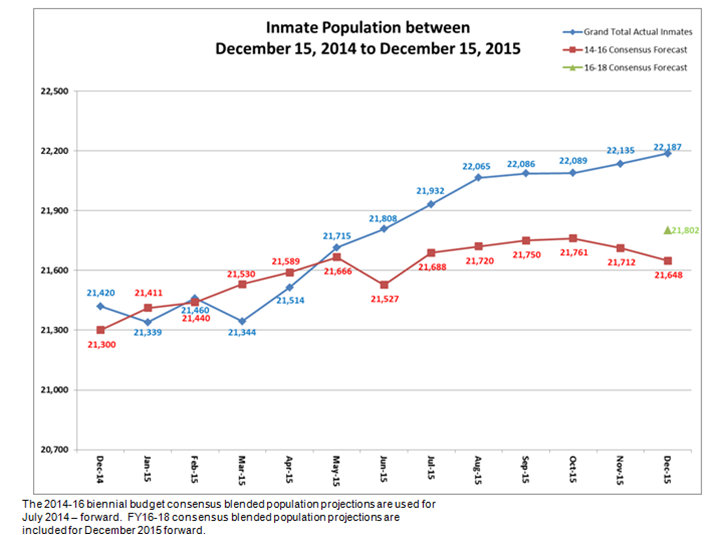While our state has taken some important steps in passing criminal justice reform legislation in 2011, additional reforms are needed. HB 412, a bill sponsored by Representative Yonts, would further the legacy of 2011’s Public Safety and Offender Accountability Act (HB 463) by reducing time spent in jail/prison for certain non-violent offenses, increasing economic opportunities for some offenders and saving the state money. Kentucky is in particular need of additional reform measures given the increases in the inmate population, as shown in the graph below, and associated spending that has been above what was projected.
Source: Kentucky Department of Corrections.
A January 2014 estimate said that HB 463 had resulted in a total savings of $34.3 million; however, the state’s inmate population has been increasing fairly steadily since mid-2013 and is now back to 2011 levels. The additional cost to the state in necessary governmental expenses for the inmate population being above projections was $72.8 million between 2012 and 2015.
HB 412 would save the state money and help more Kentuckians who have made mistakes in the past get their lives back on track by reducing time in jail/prison. The bill would do that by:
- Creating a Gross Misdemeanor level of offense: Some non-violent offenses currently classified as a Class D felony, the lowest level felony, would be newly classified as a “gross misdemeanor.” Among those affected by this new classification are people charged with certain forgery offenses and those who have consistently not paid child support. A Class D felony carries with it a charge of one to five years; a gross misdemeanor sentence would be no more than 24 months. Offenders would be held accountable through penalties and supervision but would not face the lifelong consequences of a felony conviction.
- Establishing Presumptive Parole for non-violent offenders serving sentences for Class D felonies: Non-violent offenders serving sentences for Class D felonies would automatically earn parole after serving 15 percent or 2 months of the original sentence — whichever is longer. This is important as one of the reasons HB 463 hasn’t led to greater reductions in the state’s inmate population is that parole rates went down. Over 30 percent of low risk inmates are not being paroled, at great cost to the state. According to the corrections impact statement for HB 412, this aspect of the legislation alone would save the state approximately $19.9 million a year, although it would also require costs such as for the hiring of additional probation officers.
- Providing misdemeanant jail credits: Currently those in jail for a misdemeanor are not able to earn credit toward early release — for instance, by performing community service, earning a GED credential or maintaining good behavior. Those serving time for a felony conviction can already earn credits toward their sentence.
- Ensuring implementation of graduated sanctions for those on probation and parole who commit technical violations: The 2011 reforms included graduated sanctions for those who commit technical, non-violent violations of probation and parole — rather than automatically sending them to jail/prison for a minor violation. However, these graduated sanctions are frequently not being followed. HB 412 would require a decision to revoke probation or parole be based on specific findings.
- Allowing discretionary rather than mandatory sentence enhancements for some repeat offenders: This enables the determination of an appropriate sentence without the lengthening of a repeat offender’s sentence being required in every case.
- Reducing recidivism by increasing economic opportunities for former offenders: Those affected by the new gross misdemeanor classification would have more economic opportunities than if they were convicted of a Class D felony. A felony conviction prevents many from being able to find work, and gainful employment is critical to preventing a former offender from returning to incarceration.
Several bills this session are proposing increased penalties for drug offenses — including one to reverse sentencing reforms from 2011 that created a new definition of heroin trafficking in order to differentiate true trafficking from addicts who may share drugs and undo measures from comprehensive anti-heroin legislation passed just last year. Such legislation would send Kentucky in the wrong direction, eroding the state’s prior criminal justice reform efforts and increasing state corrections costs. In addition, harsher sentences for drug offenses have been shown not to be effective in addressing illegal drug problems or increasing public safety.
HB 412, however, would help make progress toward the goals of HB 463 — reducing the state’s inmate population and creating savings in the budget.




